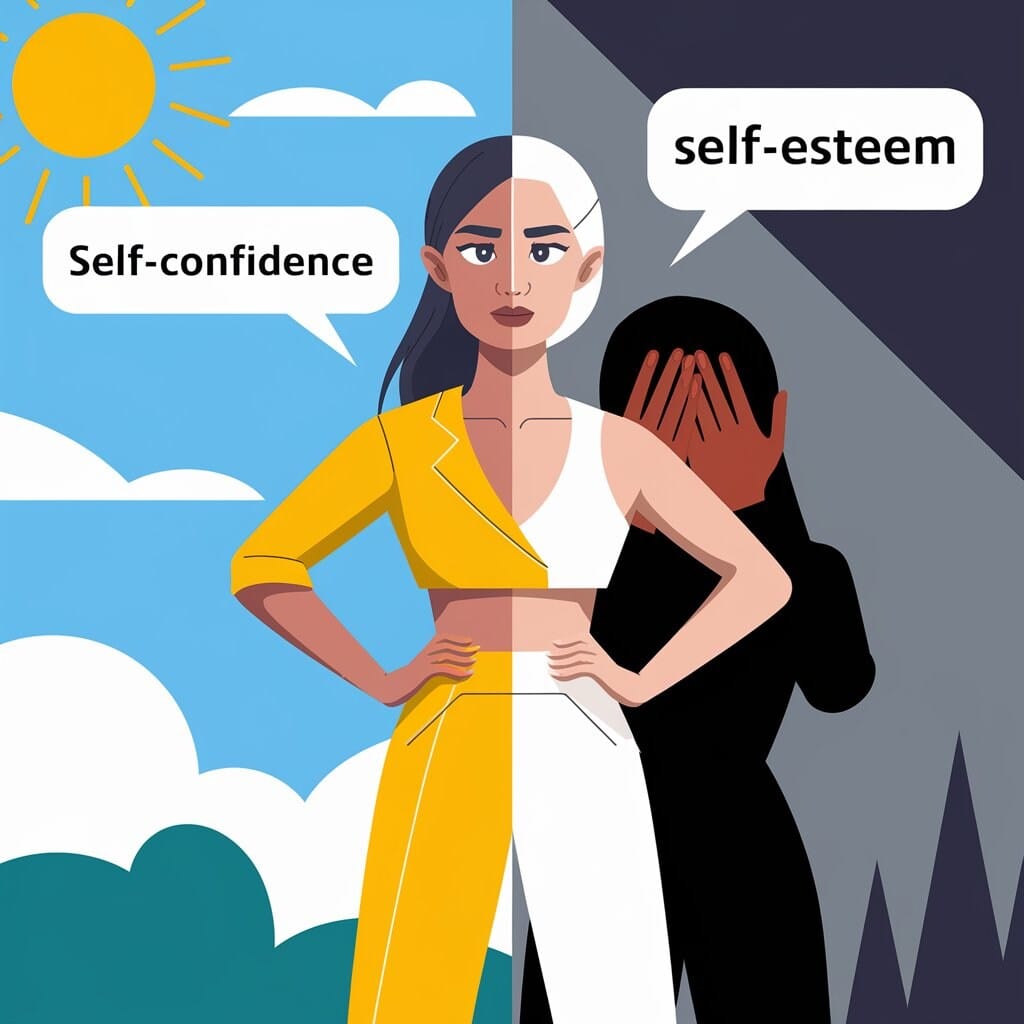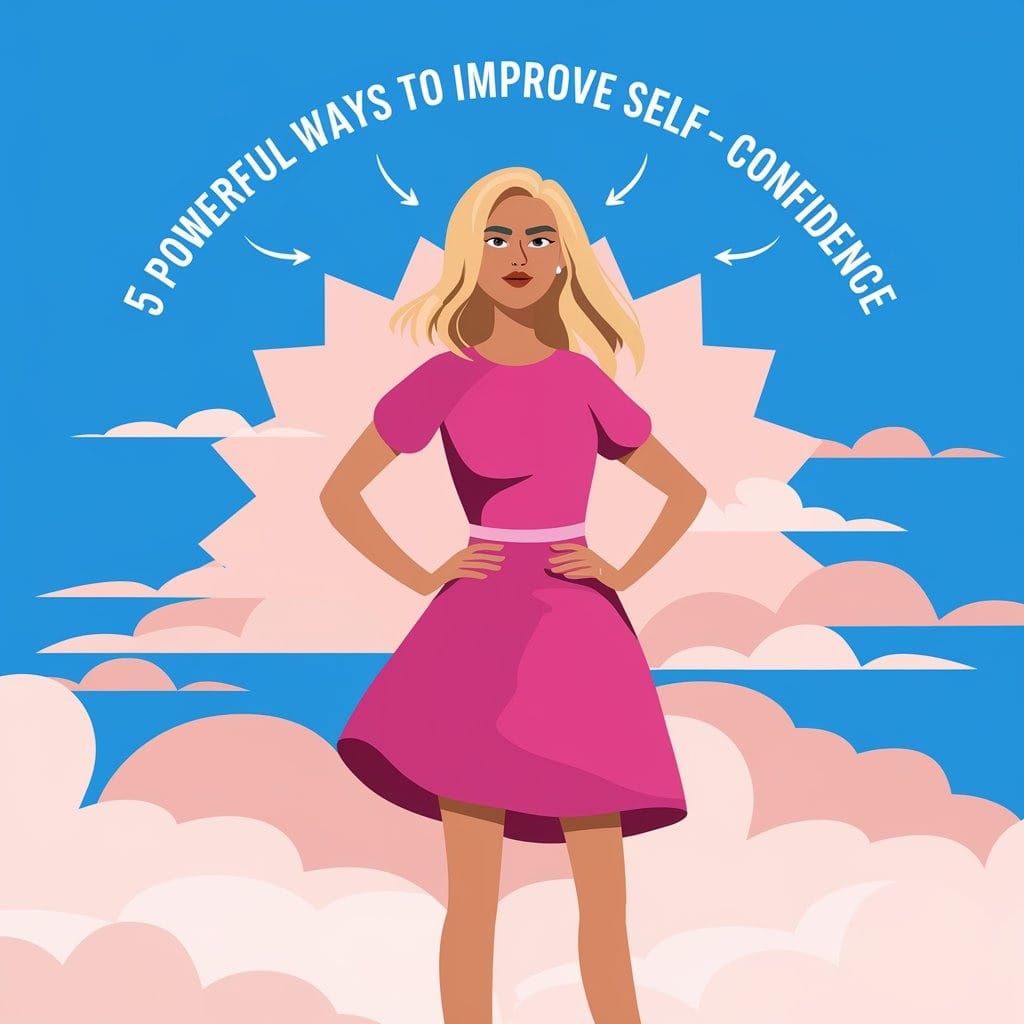Have you ever considered why some people mistrust even little things while others seem confident and brave in any scenario? This is the influence of self-confidence! Confidence is an ability we can learn, not only a personality quality.
Still, confidence directly relates to personal development. We feel strong from within when we endeavour to better ourselves—learn new abilities, broaden our thinking, and tend to our physical and mental health. Self confidence and self-improvement are inextricably linked because as we enhance our abilities, our confidence grows.
Value of Self-Confidence: Why should one have both personal and professional life?
A person’s level of self-confidence is a key factor in their personal and professional success, and it also impacts their looks.
Personal Life: Since confident people can clearly communicate their emotions and ideas, they are stronger in relationships. Less self-doubt in decision-making makes them better. Good for mental health, stress and anxiety are lessened.
Professional Life: Interviews, presentations, and networking all benefit greatly from confidence. Problem-solving capacity and leadership qualities get better. There are more chances for growth since confident people are not reluctant to meet fresh difficulties.
Common struggles that people face with confidence
Low self-confidence affects a lot of individuals, and there are many different reasons why.
Cluttered thoughts – Words like “I am a failure” and “I can’t do it” erode self assurance. When people are concerned they may mess up, they are less likely to try new activities.
Comparison with others– Seeing the life of others on social media causes one to question their own value in these day of.
Past failures – Should anything go wrong once, individuals begin to believe they cannot be successful at all.
Lack of skill or knowledge – Confidence naturally drops until one is well knowledgeable about something.
If you too suffer through similar challenges, then there is no need to take strain! Confidence can be formed like a habit. All that is required is a little self-awareness, appropriate mentality and continual self-improvement. Next we will see how you may grow your self-confidence step-by-step!
Understanding self confidence

What is Self-Confidence?
Self-confidence is believing in yourself, trusting your talents and capacities, and knowing you can correctly manage any situation. This mental state enables us to get over challenges, make decisions, and progress individually.
Self-Confidence from a Psychological Perspective
Psychologically speaking, self-confidence is the mix of self-efficacy and self esteem:
Self-Efficacy– Psychologist Albert Bandura developed this idea as he found that a person’s confidence rises naturally when he thinks he would be able to finish a project. For instance, your confidence in public speaking gets great if you routinely do it and earn little successes.
Self-Esteem – This represents a person’s general perspective of himself. Your self-confidence grows robust if you respect yourself, recognise your worth, and recognise your abilities. Those with poor self-esteem battle negative self-talk and self-doubt, therefore eroding their confidence.
The Deep Connection to Self-Confidence
Experience and information: You will feel more confident the more experience and information you possess in everything.
Mindset and Perception: Growing personally and seeing fellowship as a teaching tool helps one to get more confident.
Emotional resilience: those who bounce back from mistakes fast are more confident.
Self-confidence is something one may acquire by practice, experience, and attitude; it is not a fixed quality. The issue now is rather how? We will next discuss which doable actions could boost your confidence.
Difference Between Self-confidence And Self- esteem

Though they are separate ideas, self-confidence and self-esteem are closely related. While self-esteem is connected to general self-worth and self-respect, self-confidence results from having faith in a certain aptitude or expertise.
| Factor | Self-Confidence | Self-Esteem |
|---|---|---|
| Definition | Have confidence in your abilities and skills. | Understanding and accepting your overall worth and value. |
| Focus Area | It is based on performance and capabilities. | It is based on self-worth and self-acceptance. |
| Example | If you have experience of public speaking, you will feel confident. | Even if you are not an expert in public speaking, you will still feel that you are a valuable person. |
| Dependency | It is situation-specific—different tasks may require different confidence levels. | This is related to overall self-perception, which is more stable. |
| Effect of Failure | If a failure occurs, confidence may drop temporarily but can be regained with practice. | People with low self-esteem tend to associate failure with their worth, which affects their mental health. |
| How to Build It? | This can be improved by developing skills, taking on new challenges, and practice. | Improves self-acceptance, self-love, and a positive mindset. |
Simple Way to Remember:
Self-Esteem: “I am valuable whatever situation I find myself in!” ( conviction in self-worth)
Both should be combined; if one has just self-confidence but self-esteem is poor, one gets dependent just on successes; if self-esteem is high but self-confidence is low, one is not able to exploit his full potential.
This is why we should strike a balance to enable us to be effective and psychologically strong!
Why is Self-confidence Important
Every person’s personal development as well as their professional achievement depend on their degree of self confidence. It is not just a way of thinking but also a strong instrument that affects all spheres of life: relationships, job, decisions, even mental health. Strong
self-confidence helps one to discover a better answer to every problem.
1. Eliminates fear and self-doubt
Many people miss fresh chances in their life merely because of fear of failing. Self-confidence helps you to avoid these negative ideas and provides the bravery to meet fresh problems. You are not reluctant to take chances and investigate more when you believe your talents and abilities are strong.
2. Improves decision making
If you are confident, you can act fast and right in any circumstance. While overthinking and self-doubt can slow down a person’s development, confidence gives you logical reasoning and clear thinking so you may boldly make every little and major decision you will ever need.
3. It is the gateway to success
Self-confidence may be a revolution whether you wish to advance in your personal life or work. Every successful person—in business, sports, or entertainment—their confidence is the foundation of their accomplishment. Pursuing your objectives with confidence helps you to overcome fear of failing and to develop steadily.
4. Improve social life and communication skills
Confidence benefits one’s interactions with others as well as their alone job. People respect you more highly when you can effectively convey your ideas. Self-confidence affects your body language and speech whether you are at a job interview, a business meeting, a social event. This is the mark of a leader and increases your regard among others.
5. Keeps mental health and stress under control
People who lack confidence always doubt their value, so they suffer from worry, tension, and sadness. If you are confident, you are not much influenced by criticism and opinion of others. This shapes a solid attitude that helps you to be emotionally and psychologically steady.
6. Creates a mindset for self-growth and learning
Confident people are constantly eager to discover life, pick up fresh experiences, and acquire new abilities. Instead of fearing failing, they view it as a teaching moment. This kind of thinking guarantees ongoing development throughout life.
7. Increases motivation and productivity
Your motivation and concentration are enhanced by a belief in your capabilities and goals. Self-confidence protects you against deviations and offers a direct road to reach your objectives. It improves output and helps to complete chores quickly.
8. Develops self-respect and independence
Self-assured individuals do not seek validation or endorsement from others. You arrive to exercise autonomy and take control of your life. This helps you to reach emotional and financial independence, which are prerequisites for a successful and contented life.
Conclusion
Not only is self-confidence a great quality, but it also is a necessary quality that improves all aspect of life, including relationships, career, and mental health. It releases your uncertainty and anxiety, therefore turning you into a strong, competent, and self-reliable person. Thus, developing self-confidence is the first step if you want to advance in life.
Common Reason For low self-confidence
Individual personality depends much on self-confidence; nevertheless, many people struggle in life because of low self-confidence. This problem does not develop over night; rather, it is molded by a convergence of events. Low self-confidence results from an aggregation of psychological, social, and personal experiences rather than from a single reason, as is clear. The following are some common elements that lower self-confidence.
1. Negative Childhood Experiences
Childhood conditioning significantly influences an individual’s confidence. Excessive criticism from parents or teachers, demotivation, and frequent highlighting of mistakes can lead to diminished self-esteem. Additionally, childhood bullying, inequitable comparisons, and parental pressure may serve as substantial contributing factors.
2. Fear of failure
Individuals who perceive failure as a permanent setback rather than a lesson have diminished confidence. Each minor or significant failure or rejection compels them to question their self-worth more. This apprehension hinders people from embracing new challenges, leading to a progressive erosion of their self-confidence.
3. Constant Comparison with Others
In today’s digital era, people compare their real life by watching the highlight reels of others on social media. “He has such a good job, his life seems perfect, why can’t I be as good as him?” This thought can destroy self-confidence. Every person’s journey is different, but comparison forces a person to ignore his strengths.
4. Past Traumas aur Emotional Wounds
Those who have gone through emotional neglect, bullying, abuse, or poisonous relationships in the past naturally have poor self-worth. Someone will eventually come to believe that they are not good enough if they are told constantly such. This trauma seriously influences self-esteem and confidence.
5. Lack of Skills and Knowledge
Sometimes the reason for low self-confidence is simply that we do not have expertise in some work. When we do not trust our skills or knowledge, our confidence naturally becomes low. If you do not have experience or proper training in any field, you automatically start doubting yourself.
6. Negative Self-Talk aur Overthinking
When a person repeatedly reinforces negative thoughts within himself—”I always fail,” “I can’t do anything good”—his self-confidence naturally begins to fall. Overthinking and self-criticism create such a negative loop that distances a person from his potential.
7. Lack of support system
People who feel lonely or who do not get emotional support, their confidence becomes weak. A good support system uplifts you, but if you get only criticism and demotivation, you gradually start doubting your worth.
8. Body image issues and pressure of physical appearance
Many individuals are aware of their looks, hence their self-confidence suffers directly from this uncertainty. Unreasonable beauty standards or body shaming in society cause people to feel self-conscious about their appearance, therefore reducing their self-esteem.
9. Toxic work environment or bad experiences
If a person is always underestimated in a job or profession, his hard work is not appreciated, or he receives constant criticism, then his self-confidence decreases. Workplace bullying or toxic leadership can also be a major reason.
10. Perfectionism
Some individuals believe that one is not successful if the job is not flawless. Their perfectionism causes them unneeded anxiety and strain, which over time undermines their self-confidence. If one views every little error or imperfection as a failure, one will restrict their own development.
Conclusion
Low self-confidence can arise from several sources: negative self-talk, unreasonable expectations, early indoctrination, or societal pressure. The most crucial thing is to realize, nonetheless, that self-confidence is a talent one can acquire progressively. Understanding these causes and striving to overcome them can help you to rebuild confidence and lead your life from a fresh angle.
5 Powerful Ways to Improve Self-Confidence

Self-confidence is a skill that can be developed gradually. It is the foundation of any person’s personal and professional life. If you feel that your self-confidence is low, then there is no need to worry. The practical and effective methods given below will help you in boosting self-confidence.
1. Stop negative self-talk and develop a positive mindset
If you always look down upon yourself, overthink and see the negative aspect of everything, then confidence will naturally become low. It is important to control self-doubt and fear of failure.
How to do?
Whenever negative thoughts come to your mind like “I will fail”, replace them with “I should try, I can learn.”
Use affirmations like “I am confident,” “I know my value,” “I can face every challenge.” Start writing down overthinking and negative thoughts in a journal so that you can analyze your fears logically
2. Improve your body language and communication
Your confidence is not just in your mind, but it is also visible through your body language and the way you speak. If you speak softly, do not make eye contact or always keep slouching, then you will not seem confident.
How to do?
Keep a straight posture, straighten your shoulders and walk confidently.
Maintain eye contact when you talk to someone.
Whenever you talk, practice speaking clearly and slowly so that your message can reach the other person confidently.
Practice mirror speaking: Talk to yourself face to face for 5-10 minutes every day and pay attention to your expressions and body language.
3. Learning skills and increasing knowledge
Sometimes the reason for low confidence is simply a lack of knowledge and skills. If you do not have expertise in any field, you will naturally feel insecure. The more you learn, the more your confidence will increase.
How to do?
Start learning new skills that will help you in your professional and personal life. (like communication skills, public speaking, negotiation, etc.) Strengthen the basics of whatever you are doing—be it a presentation, an interview, or some creative work.
Have an attitude of continuous learning—read new topics every day, do courses, and update your knowledge.
4. Focus on small wins and accept challenges
Many people get overwhelmed by thinking about big goals and their confidence drops even more. But if you celebrate small achievements, then confidence will build naturally.
How to do?
Set small goals: If you fear public speaking, set a small goal to speak confidently to two people. Then gradually move up to bigger stages.
Celebrate every small success—if you make a good decision or learn the basics of a new skill, appreciate it.
Get out of your comfort zone—the more you accept new challenges, the more confidence you develop.
5. Take care of yourself – Self-care and physical fitness
Your physical health and mental state directly impact your confidence. When you take good care of your body and mind, you feel strong from within.
How to do?
Exercise: Daily workouts or running can improve your body image and confidence.
Maintain a good lifestyle: Wear good clothes, pay attention to your grooming, and find ways to make yourself feel good.
Practice meditation and mindfulness: This keeps you stress-free and focused, which is important for confidence
Conclusion
Developing self-confidence is a gradual process, but if you practice consistently you can see a positive change inside you. Stop negative self-talk, improve your body language and skills, appreciate small wins and focus on self-care—these small things together can make you a highly confident and successful person.
